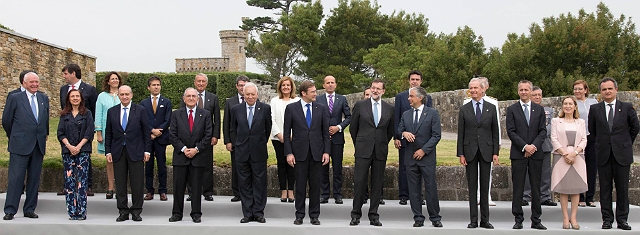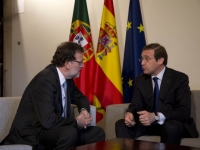Politics
Rajoy said that Spain and Portugal are an example of European solidarity
XXVIII Spanish-Portuguese Summit

(Source: Pool)
USPA NEWS -
The Spanish Prime Minister, Mariano Rajoy, said Monday that Spain and Portugal are facing an exciting future with more resources to make it available to their citizens. They have demonstrated to Europe and the world that could emerge from the crisis with "seriousness, work and long-term vision."
The Spanish Prime Minister, Mariano Rajoy, and Portuguese Prime Minister, Pedro Passos Coelho, presided in Baiona (Pontevedra, Spain) XXVIII Spanish-Portuguese Summit, the fourth since that top their respective governments. During a joint press conference, the president of the Spanish Government acknowledged that the past four years have been difficult but, in his view, have been worth it: "I have full confidence that we have gotten out of great difficulty with great effort and starts a much better time for our citizens," he said.
Rajoy said that Spain and Portugal recently commemorated the thirtieth anniversary of the signing of their accession treaties to the then European Communities. In his view, Europe has given much, but the two countries, provided by the hand, "have also contributed much to the European project," and added that "together we have faced the worst economic crisis suffered by our countries, Europe and the integration project in decades. And we did give an example of European solidarity, responsibility, reformism and restraint. And our citizens have an incomparable example effort, solidarity and responsibility," said the president of the Spanish Government.
Mariano Rajoy said after spending hard years, the two countries should focus on consolidating its recovery, take not to lose what has been achieved "with much sacrifice and effort" and pose exciting projects for the future: "Now that we have finally returned to the path of growth and job creation, now finally state resources begin to grow, we will focus on strengthening and improving the pillars of the welfare state which, incidentally, is one of the hallmarks of the European project we have managed to preserve the effects of the crisis," he said.
Rajoy and Pedro Passos Coelho noted the close coordination and identity of countries maintain their positions on key issues on the international political agenda. On Libya, Rajoy agree on the need to urgently reach a political solution to support the mediation led by the special representative of the secretary general of the United Nations: "The parties should seize this opportunity to form a government of national unity Key the future of the country and to deal more effectively to Daesh trying so hold on Libyan territory," Rajoy said.
The two leaders also discussed the migration crisis in the Mediterranean. According to Mariano Rajoy, Spain and Portugal "are an example of integration, solidarity, cooperation with countries of origin and transit of illegal immigrants." As jihadist terrorism, Spanish Prime Minister considered to represent the main threat to the international community faces. "This is not a war of religions Is civilization against barbarism And we are all clear what our objective: the eradication of barbarism."
"We have the determination to fight it and work together to achieve it. In the EU, in parallel with our partners, contemplating all areas: security; border control; intercultural dialogue; Closing his funding sources and preventing the radicalization of young people, and never forget their victims and families," he added in the press conference after the Summit.
Greece: solidarity and fulfillment of commitments
The Spanish president stressed the importance of the extraordinary meeting of the European Council held on Monday to address the situation in Greece and said that goes to the appointment with "constructive spirit." In his view, the key to reaching an agreement as solidarity, dialogue and compliance with the rules and commitments. Rajoy recalled that European loans to Greece is roughly equivalent to 100% of GDP of that country and that the principal of these loans begins to be paid within thirty years and their interests in ten."Europe has been united and wants to remain in solidarity with Greece, and we would like everyone to have an agreement which would have to as quickly as possible," Rajoy said. At the same time, he added, "it is very important that the Greek government is aware of the efforts made by citizens of other countries of the European Union" and that the integration process can only succeed if the agreement is respected.
For the president of the Spanish Government, the delay in negotiations is detrimental especially to the Greeks: the forecast growth in Greece has dropped from 3% to 0.5%, and tax revenues and jobs are being affected. In his opinion, the challenge is the same as Greece that have faced Spain and Portugal to grow and create jobs. He argued further that reducing the deficit and undertake structural reforms is what has made it possible to meet that goal: "Even if there are many things to do and the effects and consequences of the crisis still exist, Spain this year will believe above 3% and 600,000 Spaniards will find a job."
Rajoy said he does not fear "any possible contagion" because the Spanish economy, facing the "dramatic" situation of 2012, "we are in the right direction and on the road to recovery." Regarding the future of the European Union, the Spanish prime minister called for progress in the economic union, with a special focus on energy, the digital and the financial services, fiscal union and political union.
Liability for this article lies with the author, who also holds the copyright. Editorial content from USPA may be quoted on other websites as long as the quote comprises no more than 5% of the entire text, is marked as such and the source is named (via hyperlink).







